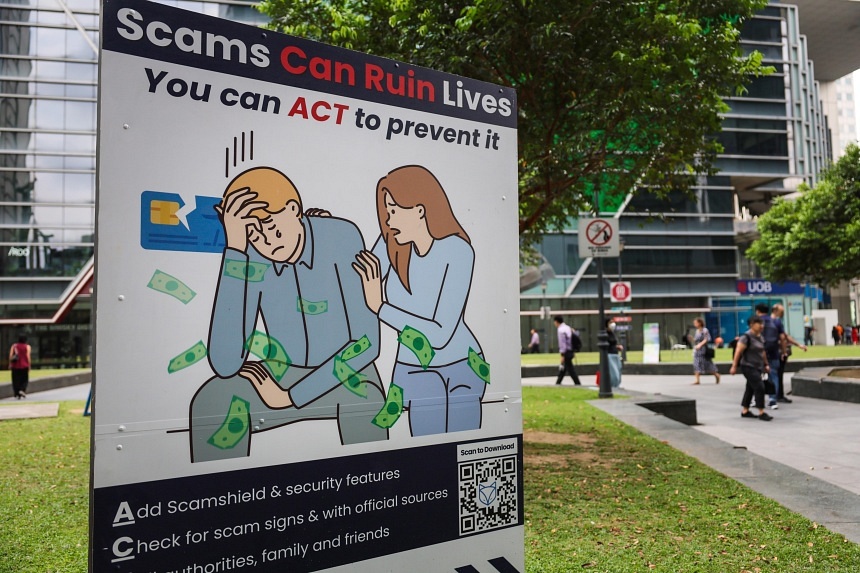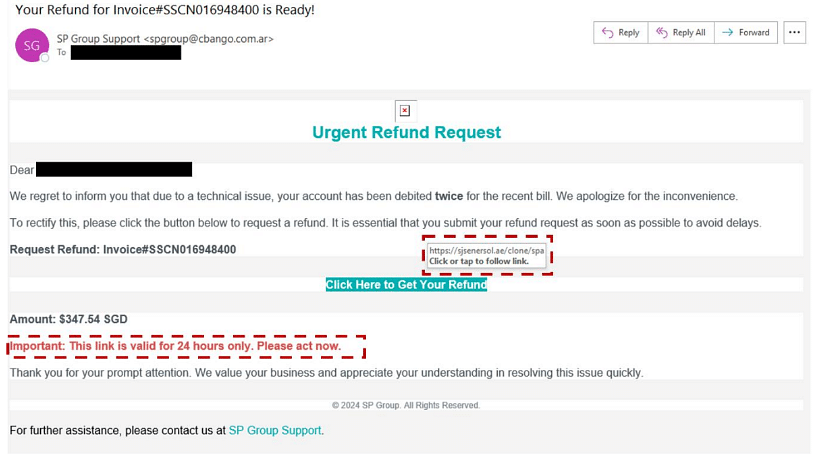Police called to office at Ubi Techpark after unhappy investors demand refund from gemstone scheme
The police were called to an office at Ubi Techpark on Aug 23, where a group of angry investors gathered to demand their money back from an investment scheme. ST PHOTO: GAVIN FOO
Christine Tan
Sep 23, 2024
SINGAPORE – Investors trying to get their money back from a gemstone scheme which bears the hallmarks of a multi-level marketing programme say they have been stonewalled for years.
The investors, who set up a chat group of about 100 participants, include a number of elderly retirees.
On Aug 23, about 10 of them turned up at the fourth floor of Ubi Techpark, in Ubi Crescent, and thumped tables and shouted at staff.
The police were called in to restore calm. The Straits Times understands that they are looking into the investors’ complaints.
The investment scheme involved amber gemstones. Investors were awarded points, which could be redeemed for cryptocurrency tokens that promised high returns.
Ms Shonna Seow, 42, a business owner, turned up at the Ubi Techpark office on Aug 23 with her parents, who are in their 80s.
She said her parents each invested $35,000 in 2017 with Global GC.
Her mother told ST in Mandarin: “We didn’t earn any profits, not even one cent. We only got a few hundred dollars from introducing new members. They said those were profits, but it was actually only commission.”
Ms Seow said that when they tried to get their money back, they were told they had to pay a sum of money.
She said the money her parents invested was part of the proceeds from selling their three-room flat.
“They wanted to keep the money for their retirement. But they were swayed by their friend’s words to invest.
“I asked the (firm’s representative), ‘These old people don’t even know how to use computers, how do you expect them to understand cryptocurrency?’” she said, adding that she has made a police report.
Ms Shonna Seow's parents, who are both in their 80s, said they were asked to pay a sum for a chance to get back their $70,000 investment. ST PHOTO: GAVIN FOO
Retiree Dennis Tan, 56, said he invested more than US$20,000 (S$25,800) in 2015 with USFIA Singapore.
He said the company offered a “commission” of 10 per cent of their investment sum for every new member investors recommended. He added that the promised profits from the investment scheme never materialised, and has filed a police report about the matter.
USFIA Singapore and Global GC are listed on the Monetary Authority of Singapore’s (MAS) investor alert list.
Checks by ST showed that USFIA Singapore, which was formed in 2014 and struck off in 2020, had listed one Mr Wong Yet Loong as director.
Mr Wong, who is also known as Lionel Wong, registered Global GC in 2015. The firm was struck off in 2023.
The business office at Ubi Techpark is currently registered to Amtop Holding and Universal Mall. Amtop Holding was created in 2018, and Universal Mall was registered in 2017.
Mr Wong Yet Loong (in blue shirt and mask), also known as Lionel Wong, speaking to investors at an office at Ubi Techpark on Aug 23. ST PHOTO: GAVIN FOO
Amtop Holding is a holding company, while Universal Mall is involved in software development and wholesale trade.
Mr Wong was at the Ubi Techpark office on Aug 23 and spoke to investors, who referred to him as “boss”.
Business records show he is not among the appointment holders of Amtop Holding and Universal Mall.
However, he shares the same residential address with Ms Lim Ai Lan, director of Universal Mall, and Ms Wong Ji Hui Joyvina, director of Amtop Holding.
Mr Wong and the staff at Ubi Techpark told investors that their investment was handled by Estonian-registered company, MaxiTrading Invest OU, where Ms Wong is the owner.
A check by ST on Aug 26 found MaxiTrading Invest OU was in liquidation. It was deleted from the Estonian business register on Sept 15.
MAS said MaxiTrading Invest OU, Amtop Holding and Universal Mall are not licensed or authorised by the regulator to provide financial services in Singapore.
US links
USFIA Singapore was linked to USFIA Inc in Los Angeles. US citizen Steve Chen, founder of USFIA Inc, was a director and shareholder of USFIA Singapore.
The US Securities and Exchange Commission (SEC) described USFIA Inc as a pyramid scheme and took Chen to court in 2015.
They said he made false and misleading representations, including claims that the firm owned several large amber mines in the Dominican Republic and Argentina.
Chen pleaded guilty to federal criminal charges that he had falsely promised profits to more than 70,000 investors worldwide, and was sentenced to 10 years’ jail in January 2021.
Investigators in the US found a money trail from USFIA Singapore to Chen.
A report in June 2024 found that Chen had raised about US$197 million from investors. A large portion of the money was used to fund his lavish lifestyle.
Mr Wong has repeatedly distanced himself from USFIA Inc, and continued to do so on Aug 23.
He told ST that there were “a lot of problems” in the US, and there were things that “could not be done” in Singapore, without elaborating.
Mr Wong is no stranger to angry investors. In September 2015, a man used a chopper and a knife to threaten him.
The man wanted the $450,000 his wife had invested with USFIA Singapore returned. Court documents then described it as a multi-level marketing company.
The man’s wife got her money back but he was sentenced to three weeks’ jail for criminal intimidation in November 2016.
In an e-mail reply to ST’s queries about the company’s investment plans, its beneficial owners and history, MaxiTrading Invest OU said it has handed the matter over to its lawyers and the police.
It added: “We reserve all legal rights in this matter. Thank you for your understanding.”
Civil case
Commercial lawyer Daniel Soo said firms that do not intend to invest in what they promise could be committing fraud.
“If (investors) were misled into believing that this transaction would likely result in them making a profit, and if these representations were found to be false, then they would have a remedy by way of a civil claim for fraud,” added Mr Soo, head of Selvam’s insolvency and restructuring practice.
Even if companies are struck off, investors could file suits against their directors for personal liability in some cases, he said.
He added that if the scheme offered members a commission from introducing new members but no other income, it would be a multi-level marketing or pyramid scheme, which is illegal in Singapore.
Silvester Legal managing director Walter Silvester said investors should ask company directors to put their claims about investment schemes in writing so they have documentary evidence of such promises.
He said there is a difference between fraud and a failed business venture.
“It could very well be that (the director) actually had this whole idea and genuinely wanted to get this amber and (cryptocurrency) thing going, and it just didn’t work out,” he added.
If this case was deemed to be a failed business venture, he said, it is unlikely that investors can get back their money.
MAS said investors should do their checks before dealing with any entity offering financial products and services. They can do this via its Financial Institutions Directory, its investor alert list, and its register of representatives.
Said a spokesperson: “They should ask for details about the entity, including its track record and background of the people running the operation before making any investment decision.”
He added that investors are strongly encouraged to deal only with people who are regulated by MAS, as those who deal with unregulated entities will not have the protection that come with the authority’s regulations.










































